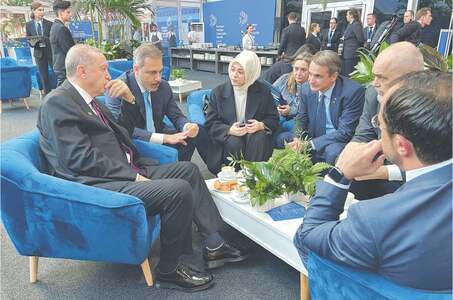 VIENNA, Oct 13: North Korea on Monday restored access for UN monitors to its atom bomb complex following a deal with Washington to salvage a denuclearisation process endangered by disputes over verification, diplomats said.
VIENNA, Oct 13: North Korea on Monday restored access for UN monitors to its atom bomb complex following a deal with Washington to salvage a denuclearisation process endangered by disputes over verification, diplomats said.
“The (International Atomic Energy Agency) inspectors can access all facilities at Yongbyon again, including the reprocessing plant,” said one diplomat, referring to the site that made plutonium fuel for Pyongyang’s atomic bomb programme.
The diplomats were familiar with IAEA operations but were not allowed to discuss such confidential information publicly.
There was no immediate comment from the UN nuclear watchdog’s headquarters in Vienna. But one official said fresh information on the monitors’ status could come later in the day.
North Korea had barred the inspectors from Yongbyon last Thursday in anger over Washington’s refusal to remove it from a sponsors-of-terrorism blacklist in a dispute over the extent of verification measures required for denuclearisation.
The US State Department announced on Saturday that it had delisted the Stalinist state after Pyongyang agreed to a series of verification steps. On Sunday, North Korea said it would resume disablement work and re-admit IAEA monitors.
A diplomat said the three inspectors’ first job would be to reassess the status of Yongbyon’s facilities, since Pyongyang had taken steps in recent weeks to reactivate them.
The IAEA was also likely to require details of the verification deal to smooth the task of re-establishing regular safeguards inspections in North Korea, which walked out of the nuclear Non-Proliferation Treaty in 2003.
NO NEW DISABLEMENT WORK SEEN: South Korea said on Monday it had seen no signs of the North restarting work to take apart Yongbyon, a Soviet vintage complex including a fuel fabrication facility and a five-megawatt reactor.
Under a February 2007 disarmament deal with five powers, North Korea was to have been removed from the US blacklist once it provided a full accounting of its nuclear programmes and accepted a system to check its claims.
The isolated, impoverished North has longed to be delisted so it can draw from international finance, see a myriad of trade sanctions dropped and use global settlement banks to send money abroad instead of relying on cash-stuffed suitcases.
But the deal threatened to unravel after Pyongyang signalled it had no intention to let foreign monitors scour the nation at will and poke into any military or other high-security site.
Washington’s decision to delist North Korea was made after the North agreed to access for experts to all declared nuclear facilities and, based on ‘mutual consent’, undeclared sites.
Experts from the six nations handling the North Korean dossier the two Koreas, Russia, China, Japan and the United States could participate in verification, and the IAEA would have an “important consultative and support role”.
Measures would encompass the plutonium bomb programme as well as “any uranium enrichment and proliferation activities”.
But the deal has yet to be formalised, and implementation almost certainly remains a treacherous challenge.First, North Korea has reported producing less plutonium than the United States has estimated, which is about 50kg, or conservatively enough for six to eight nuclear bombs.
Second, Washington wants to be able to check on suspicions that the North has a covert programme to enrich uranium for weapons giving it a second pathway to atom bomb capability and that it exported the proliferation-prone technology.
Most of the dismantling steps, begun last November, had been completed and were supposed to take at least a year to reverse.
As a part of the 2007 disarmament deal, North Korea began receiving 1 million tonnes of heavy fuel oil, or aid of equal value such as steel, when it froze operations at Yongbyon last year and allowed in nuclear inspectors.—Reuters













































Dear visitor, the comments section is undergoing an overhaul and will return soon.